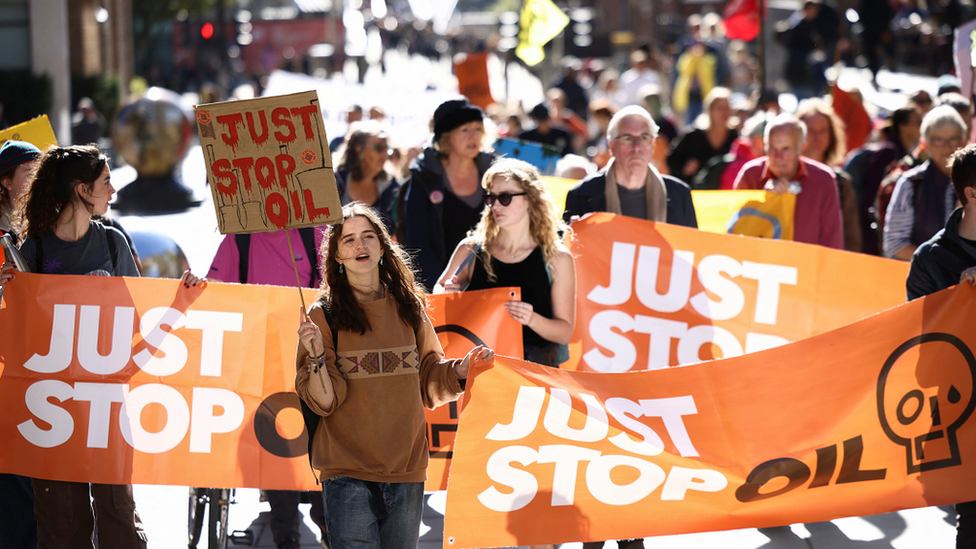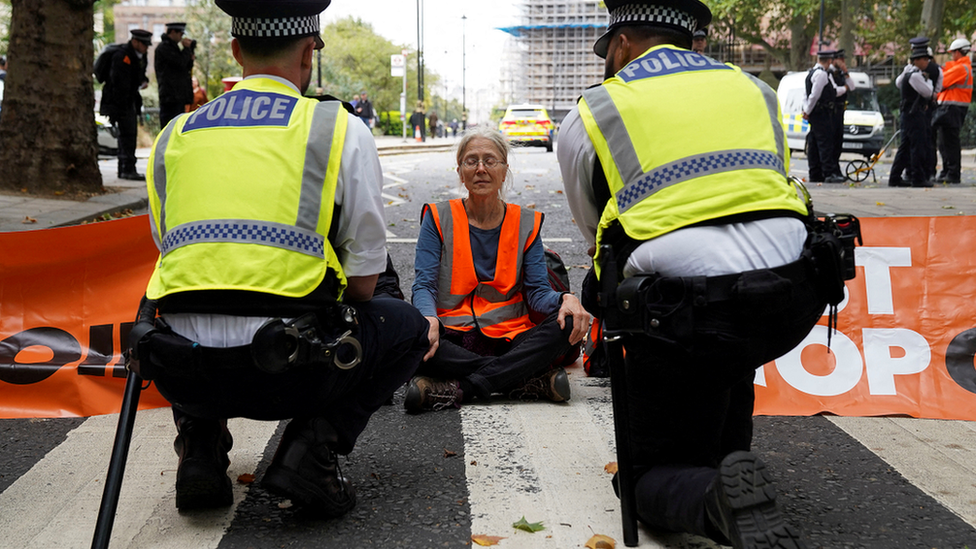Just Stop Oil: What is it and what are its goals?
- Published

Just Stop Oil activists have sprayed orange powder paint on parts of Stonehenge.
The environmental campaign group has carried out many high-profile protests, including blocking roads, stopping play at sports matches and halting theatre productions.
It wants action on climate change, but its tactics are controversial.
What is Just Stop Oil and what are its aims?
Just Stop Oil (JSO) wants the UK to stop approving new fossil fuel projects, which are a major cause of climate change.
However, in July 2023, Prime Minister Rishi Sunak announced that 100 new North Sea licences had been granted.
And in November, he said further licences would be awarded annually.
The group says it uses "non-violent civil resistance" and will stop protesting when the government announces an end to fossil-fuel production.
Just Stop Oil is linked to other environmental groups, including Extinction Rebellion and Insulate Britain.
What are Just Stop Oil's tactics?
The group came to prominence when its activists shut down major roads such as the M25 and Dartford crossing in November 2022.
Since then, JSO has also targeted several major sporting events, including the Wimbledon tennis championships, the second Ashes Test at Lord's cricket ground and the World Snooker Championship in Sheffield.

The World Snooker Championship match at the Crucible, in Sheffield, was abandoned after Just Stop Oil's intervention
Cultural events, including a performance of the musical Les Miserables in London and a BBC Proms concert at the Royal Albert Hall, have also been disrupted.
In the National Gallery, supporters threw tomato soup over Vincent Van Gogh's painting Sunflowers and smashed the protective glass screen on Diego Velazquez's Rokeby Venus.
JSO protesters also damaged the case around the Magna Carta, at the British Library.

In June 2024, two activists were arrested on suspicion of damaging Stonehenge, a United Nations Educational, Scientific and Cultural Organization (Unesco) world heritage site.
Just Stop Oil said the orange powder paint was cornflour and would "wash away with rain".
English Heritage chief executive, Dr Nick Merriman, said there appeared to be "no visible damage" after experts cleaned the site.
But Mr Sunak said it was a "disgraceful act of vandalism", while Labour leader Keir Starmer called it "outrageous" and JSO "pathetic".
Is it legal for Just Stop Oil to block roads?
The maximum penalty for the wilful obstruction of a highway in England and Wales is 51 weeks in prison. Offenders can also be fined.
Several transport bodies, including National Highways and Transport for London, have sought High Court injunctions to prevent protesters disrupting major roads.
Anyone breaching an injunction can be held in contempt of court, and could face imprisonment, an unlimited fine and seizure of assets.
The man angrily confronted the protesters - Credit: Dominic Conquest
How else is the government tackling Just Stop Oil protests?
In 2023, Parliament passed new anti-protest legislation under the Public Order Act.
This gives powers to prosecute someone who interferes with the operation or use of key national infrastructure in England and Wales - including roads, railways, and air transport.
Previously, the police could generally only restrict a protest if they could show it may result in "serious public disorder, serious damage to property or serious disruption to the life of the community".
The new legislation, external lowers the threshold for "serious disruption", allowing police to respond to action which prevents or delays day-to-day activities such as completing a journey.
It also made "locking-on" - whereby protesters attach themselves to buildings, objects or other people - a criminal offence.
Many Just Stop Oil activists have used this tactic.
In May 2024, BBC News reported a review into tackling political violence, by Lord Walney, would suggest "extreme protest groups" such as JSO could be banned in a similar way to terrorist organisations.
The plan could limit the activities of organisations that have a policy of using criminal offences or causing serious disruption to influence government or public debate.
At the time, the Home Office said ministers would consider the recommendations - but the general election was called a few weeks later and it is now unclear when or if Lord Walney's report will be published.
In response, JSO said the government were the "dangerous radicals that are endangering all of us", through its climate policies.

What does it cost to police Just Stop Oil protests?
In December 2023, the Met Police said it had spent £20m policing JSO protests and the time spent on the group equated to roughly 300 officers being removed front-line policing each day.
It said the group "refused to engage" with police when planning protests.
"Our desire is that Just Stop Oil come forward and speak with us, so we can actually work with them," Cdr Kyle Gordon said.
"We absolutely understand and support the fundamental right to protest within a democratic society - but what we've got to do is balance that right with the rights of everybody else who is using this city."
In the past Just Stop Oil has quoted a 2021 Supreme Court ruling which found there should be a "certain degree of tolerance to disruption to ordinary life, including the disruption of traffic", as a result of non-violent protest.
Who funds Just Stop Oil?
According to its website, most of its money comes from the Climate Emergency Fund, external - a US network which has supported climate activism since 2019.
That is part-funded by US philanthropist Aileen Getty, the granddaughter of petrol tycoon J Paul Getty.
Just Stop Oil says it also receives donations from the public and other organisations concerned about climate change.